© Nrf
The Russians, it seems, will believe any old rubbish fed to them by Vladimir Putin, the murderous dictator who heads their government. It’s hard to believe they are all stupid but if they believe Putin, a proven liar with a long history of giving out false information according to what best serves his self-obsessed purpose, then they must at the very least have been extremely gullible. In case any uncommitted Russians happen to be reading this (unlikely, I know) let’s make one or two things straight. Ukraine is not, as Russia’s Foreign Ministry spokesperson, Maria Zakharova, claimed, run by “Kyiv’s neo-Nazi regime”. That is jus, quite frankly, nonsense. The regime in Kyiv is not by any manner of means Nazi. You’d think Putin would be able to recognise Naziism, since it’s the political policy on which he runs Russia, but it seems he chooses not to. Ukraine, unlike Russia (in every possible way) is not Nazi. Putin’s Russia is. Putin has accused the Swiss of abandoning the country’s long-held policy of neutrality to help prop up a Nazi state. As with so many of his utterances, it’s simply untrue. When I was little, my mother said that if I told a lie my nose would grow longer. In Putin’s case, perhaps the “nose-extension” theme has been reapplied to his notorious table: every time he tells a fib it gets a little longer, in which case his desire to take over other countries may be necessitated by his ever-lengthening table. I can’t say this often enough: Putin is a liar. He’s also a self-obsessed mass murderer but for here and now let’s just call him a liar. Anyone who believes his (and Ms. Zakharova’s) claims of Naziism on Ukraine’s part is either one of Putin’s willing puppets or a complete fool. Or possibly both.
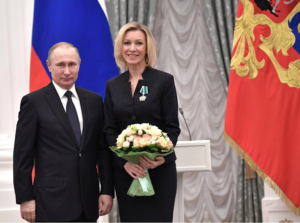
Not that Switzerland hasn’t helped some fairly dodgy regimes in the past, such as the Soviet Union, for instance. Back in the days when the KGB was set on acquiring Western technology by fair means or foul (mainly foul), Putin arrived on the scene to become involved in a string of front companies that Russia had set up in Switzerland but also in Germany, Austria and Liechtenstein to run the smuggling operations for Western military technology that Russia needed. Russia used trusted agents to amass high-tech blueprints and other goods with which Moscow hoped to defeat capitalism. The KGB had agents working inside Siemens, Bayer, Messerschmidt and Thyssen and Putin was personally involved in their espionage operations, together with his Stasi colleague, Horst Jehmlich. Putin always claimed that he’d used no false names or other such subterfuge, but he called himself Platov back then, which he later explained away to students as a “technical pseudonym”. If you want to know more about Putin’s time spying with the intention of destroying capitalism on behalf of his Communist masters, I can only recommend Catherine Belton’s book, “Putin’s People”. It’s very scary and explains just what a truly unreliable, untruthful and (from our perspective) unreliable person Putin was, is and is likely to remain. He was (and may still be) a committed Marxist but his actions and attitudes seem to align him more with today’s neo-Nazis,whom he claims to despise.
Putin’s recollections of the KGB, in which he served, of course, are interesting more for what they don’t include than for what they do. The KGB, of course, changed its name many times: the GPU, GPRU, NKVD and MGB, before settling on KGB. It was based on a secret decree written by Lenin and called the Cheka, the main building block for the Soviet police state, set up to protect the party and its leadership and to dispense what its members referred to as “revolutionary justice”.
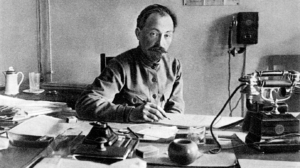
Those who served in it from the outset called themselves “Chekists” right up until its supposed disbandment in the 1990s. Long after that, Putin still referred to himself as a “Chekist.” It seems likely that Lenin would have had little time for him. The Cheka’s first leader was Felix Dzerzhinsky, a Polish man expelled from his school for persistently speaking Polish when the Tsars were still in charge, insisting that everyone must speak Russian. By a strange irony, it’s one of the things upon which Putin is also insistent: the Ukrainians must speak Russian. Stalin would have hated that, being a Georgian who insisted on using his mother-tongue. Dzerzhinsky was said to have lacked any sort of sense of humour. He was also described as being “puritanical”, which perhaps points the way towards Putin’s own supposed puritanism today. Seeing what Putin’s troops get up to in Ukraine the idea of Puritanism doesn’t really fit very well. Interestingly, it was Lenin himself who, in a note to Dzerzhinsky, suggested that this new organ of the state should only make its arrests at night. The people of Russia, innocent or guilty, came to dread the sound of a knock on the door during the small hours, when they felt most vulnerable.
Russia under Stalin was a strange place. But there again, Stalin himself was a strange man. He could be (albeit rarely) quite humble. When the Second World War ended and his troops planted the Soviet flag on Germany’s Reichstag in Berlin, Stalin felt he had let people down by failing to halt the Nazi advance earlier. At an assembly of army commanders in the Kremlin, he said that the people of Russia would have had the right to criticise the leadership. “Another people might have said to the government: ‘you have not lived up to our expectations, go away, we will set up another government’. Our soviet people, above all our Russian people, did not do that.” Stalin raised his glass and toasted “the Russian people for its trust.” It was a remarkably humble – and surprising – act on Stalin’s part. By that time, Britain was a fading power and it was during the Potsdam Conference that Churchill was voted out of power.
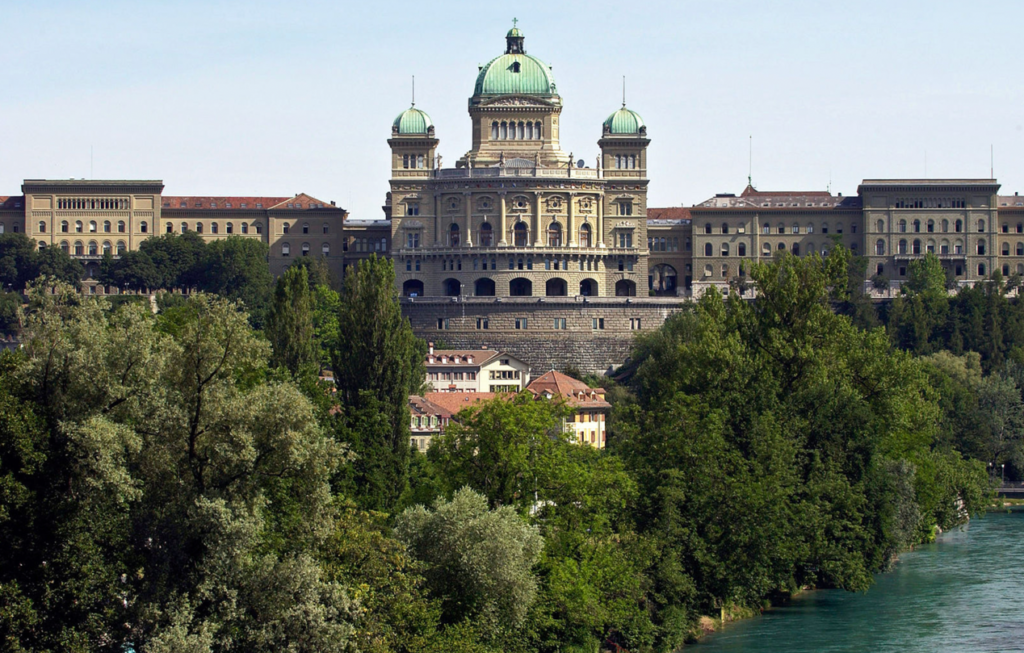
Switzerland maintained a state of “armed neutrality” throughout both world wars. Nobody attempted to conquer it, possibly because its extremely mountainous terrain would have made that difficult. Now the Swiss must decide what to do in response to Russia’s armed aggression. It may be keen to retain its neutrality, but that doesn’t mean it cannot react at all. It has adopted the new EU sanctions against Belarus and Russia and is also applying new financial and travel restrictions on a hundred more individuals and bodies. The Federal Council has also added the oligarch Aleksandra Melnichenko to its list of those facing sanctions. According to Reuters, the list of individuals and entities on the list for sanctions now includes military personnel held responsible for atrocities committed in Bucha, people involved in politics and the spread of disinformation (a Russian speciality under Putin, it seems), as well as some oligarchs and their families. Reuters has also said that the Swiss will apply sanctions to four new Russian and Belarussian banks, including Russia’s largest, Sberbank (SBER.MM) which can no longer participate in the SWIFT transaction system, which is likely to severely hamper commerce.. Switzerland’s President, Ignazio Cassis, has expressed his shock at Russia’s military aggression and in an address to the 77th session of the UN General Assembly in September 2022, he urged Moscow to put a stop to its war in Ukraine. It seems very unlikely that Putin and his allies will take any notice. Putin just thinks the rest of the world is being unfair in opposing his illicit invasion of a sovereign country which he (and his disciples, but nobody else) claim to be “Nazi”.
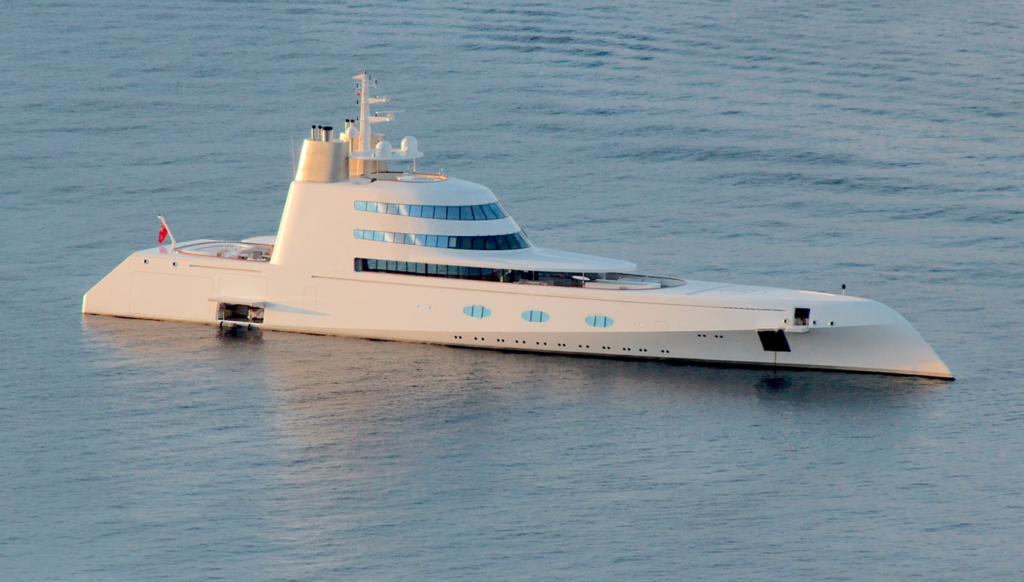

Switzerland managed to retain its neutrality in both world wars (narrowly in the First World War), although some of its army officers clearly sided with the Nazis in the Second. Hitler’s Luftwaffe regularly flew through Swiss airspace, against the rules on neutrality, but after eleven German planes had been shot down it stopped. Hitler was furious: German aircraft shot down with German-made anti-aircraft weapons. He even sent saboteurs to try to make it impossible to fly from Swiss airports, but they were captured and imprisoned. The Swiss were also somewhat ambivalent concerning those seeking asylum because of race or religion, although those being sought by name by the Axis powers could gain asylum there. All in all, it seems odd that Russia is now accusing Switzerland of taking Ukraine’s side. It has no reason to, other than a strong dislike for armed aggression by one country against another. And if the Russians still respect (or remember through their history lessons) the great leader of the Bolshevik movement and of Communism, Vladimir Ilyich Lenin, they should recall that his memory is still revered by a few in Switzerland (most seem to prefer to forget the link). Lenin successfully persuaded the Swiss authorities in 1914 that he was not a deserter.
He and his wife, Nadia Krupskaya settled in peaceful, middle-class Bern while he tried to establish contacts with local left-wing politicians, albeit not very successfully. His ideas, which he put forward at the secret Zimmerwald and Kiental conferences of 1915 and 1916, were attended by various left-wing dissidents. Lenin himself wanted to use the First World War to help spur an armed uprising against capitalism. His ideas were, in the main, rejected by other delegates. He found it especially hard to convince the highly influential Bernese Social Democrat Robert Grimm of his ideas.
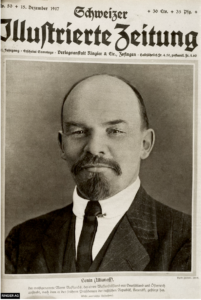
In 1916, Lenin moved to Zurich (with the permission of the Swiss authorities) where he rented a 2-room flat. In a letter to his mother he said he liked Zurich very much and he and his wife spent many afternoons just sitting admiring the lake and its surroundings. Perhaps it was one of the happiest periods of his life, although he could not have known that at the time. He was not hugely successful in gaining new recruits and his interest in persuading the Swiss to join him faded when he learned of the revolution that had started in Russia, so in April 1917 Lenin left Switzerland and travelled to St. Petersburg. By October of that year the Bolsheviks had taken control of the country and Lenin became a hero of the far left. Moving ahead a couple of decades, by 1940, Hitler had seized all Germany’s neighbours except for Switzerland. Meanwhile, Hitler had decided he hated the Swiss for reasons that are still not very clear. In 1942, Hitler described Switzerland as “a pimple on the face of Europe” and as a country that “no longer had a right to exist”. Moreover, he denounced the Swiss as “a misbegotten branch of our people.” Not very complimentary. Many have asked why Hitler didn’t order an attack, but as one commentator pointed out, it’s never wise to attack your banker. Anyway, his views of the Swiss seem now to be being echoed about Switzerland by Putin
| Chemical products for sale
Switzerland admits that it provides some services to Ukraine. Military training, for instance, and also a range of humanitarian cargoes, mediated by the Swiss embassy. The Swiss purchased 4,000 tons of humanitarian goods from their manufacturers and also supplied chemical reagents, which can be used to check if a particular chemical is present because of the way a substance reacts to it. Examples of reagents include Grignard reagent, Tollens’ reagent, Fehling’s reagent, Collins reagent, and Fenton’s reagent (don’t ask me what they’re used for; I was always a duffer at chemistry). According to the websight Thought Co, for example H2 (hydrogen gas) and O2 (oxygen gas) are reactants (or reagents) in the reaction that forms liquid water: 2 H2(g) + O2(g) → 2 H2O(l). However, a substance may be used as a reagent without having the word “reagent” in its name. Basically, it’s a way of checking for the presence of a particular chemical or group of chemicals in the substance being tested.
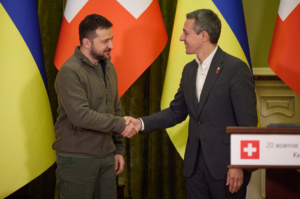
Switzerland also initiated financial assistance to both the Ukrainian and Moldovan governments for this year to a value of 140-million Swiss francs (€142.69-million). The Russians argue that this is a break with neutrality and that therefore the Swiss government is “taking sides”. Let’s see: small country, only recently independent, under vicious attack from huge, well-armed neighbour…Yes, it’s easy to see how a “neutral country” may feel encouraged to “take sides”, almost inevitably on the side of the small victim of unprovoked and deadly attack and against the unprovoked attacker, it would appear.
Putin also seems to have his eye on Ukraine’s elected leader, Volodymyr Zelensky, who has described himself as: “Target number one; my family is target number two.” Russian troops have tried to storm the presidential compound twice, according to Zelensky’s advisor. As for Switzerland, it would seem that Russia itself gave up on Swiss neutrality through its actions. The Swiss Department of Economic Affairs, Education and Research (EAER) said that it is now applying strict sanctions to the Wagner group for “their active involvement in Russia’s military aggression against Ukraine” and for the mercenary group’s “dissemination of pro-government propaganda and disinformation.” Putin is not the only liar engaged on Russia’s behalf; it seems to be official Kremlin policy.
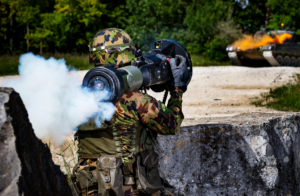
For example, in an on-line message from Russian Foreign Ministry spokesperson Maria Zakharova, she claimed that: “Despite more than two centuries of experience in implementing the policy of external neutrality, after the start of Russia’s special military operation in Ukraine (they still won’t call it a war, which it clearly is), Bern abandoned its traditional neutrality and unequivocally came out in support of Kyiv’s neo-Nazi regime.” As we all know, that is a lie on several levels. Kyiv’s government is not “neo-Nazi” in any way or by any standard, and Russia’s aggression has no excuse at all. Putin simply wants to expand the territory under his control. He is greedy for land, for towns and cities, for farms and factories and his record of fair governance is virtually non-existent. The plain truth would seem to be that he’s a gangster.
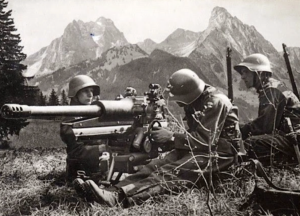
Were Putin to decide to invade Switzerland he would face the same obstacles that has affected previous aggressors: the Alps, which are naturally defensible. Hitler certainly wanted to invade, as did his ally Benito Mussolini: Operation Tannenbaum, previously referred to as Operation Grün, was a planned invasion of Switzerland and Liechtenstein by the Axis Powers during World War 2. By June 1940, France had been defeated, Poland, Norway, Denmark, Luxembourg, the Netherlands, and Belgium were occupied while Austria and Czechoslovakia had been incorporated into the German Reich. Italy, Hungary, and Romania were already allies or even satellites of Nazi Germany, while Francisco Franco’s fascist regime ruled in Spain. Democracy had been all but snuffed out across the entire European continent. But Switzerland, surrounded on all sides by Nazis and their vicious pals, stood apart. It made Hitler furious; he considered that the Swiss people should be his natural allies and their fierce independence infuriated him. In many ways, including his reputation for lying, Hitler had a lot in common with Putin. Germany’s planned invasion simply never happened, and nobody is completely certain why, even today. We must simply be very pleased that it turned out like that.
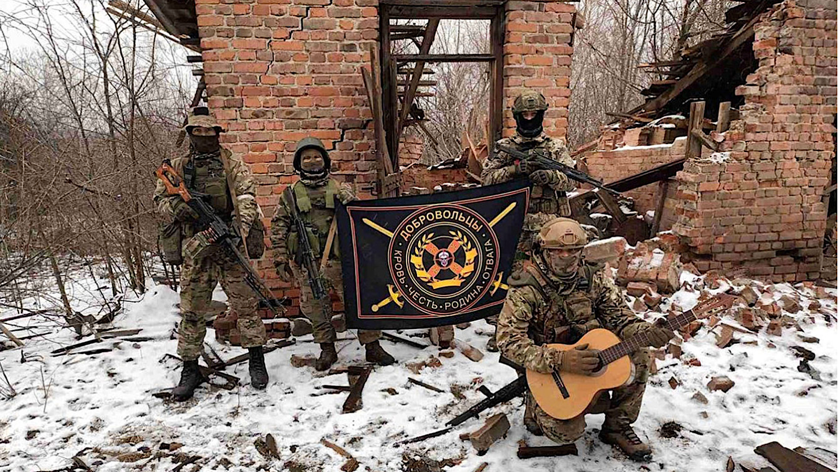
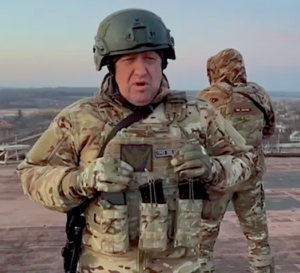
Russia and its mercenary allies, the Wagner Group, are merciless and ruthless in their bid to emerge supreme. The leader of the group, Yevgeny Progozhin, recently ordered his fighters to start killing every Ukrainian soldier they find rather than take the men as prisoners of war, according to the Radar Online website. The order was allegedly posted on the Wagner PMC Telegram account. It may not come as a surprise, but it is in breach of the United Nations laws and the four Geneva Conventions governing the conduct of wars. Not that Putin and friends have much time for standards of conduct being observed, nor for international law. He is a mass killer, as well as a confirmed liar, with no morals at all, so it’s inevitable that they will be, too. It strikes me as strange that a man who condemns any laws that permit human rights to people who identify as homosexual or transgender as “satanic” should applaud simple murder and even torture as being fine, but Putin is a very strange person indeed.
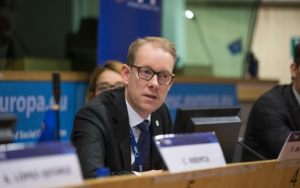
He will doubtless be annoyed that Sweden has now expelled five Russian embassy staff for spying. Foreign Minister Tobias Billstrom said in a statement that their activities were “incompatible” with their diplomatic status. Switzerland, of course, has been and remains a popular place in which Russian oligarchs can stash their wealth. Any assets belonging to Putin, however, or to Prime Minister Mikhail Mishustin or Foreign Minister Sergey Lavrov, will be frozen and confiscated, while its airspace is closed to flights from Russia. Entry bans have been imposed on anyone linked to Putin or the Russian government. Dmitry Medvedev, Deputy Chair of Putin’s Security Council has issued the warning at a conference in Moscow that the world is “probably” on the verge of global war, with a growing risk of nuclear confrontation. Only Putin is stupid enough, surely, to use nuclear weapons just because he wants to rule over a larger country. He says avoiding it is “more important than climate change”. Where Putin is concerned, ambition seems to have largely displaced common sense.
There’s not a lot the rest of the world can do about this. It could cave in, allowing Putin to take Ukraine and any other country he fancies (probably quite a lot), but it won’t, because a world ruled by an apparent psychopath like Putin would be virtually uninhabitable. Nobody wants that, except Putin himself, of course, and his coterie of acolytes. So, let’s all hope that Putin develops a little common sense and backs away from provoking a nuclear confrontation. After all, Russia is not the only country with nuclear missiles at its disposal. Ironically, if Putin ever goes completely mad and unleashes his nuclear holocaust, one of the few places on Earth that would be relatively safe and well-protected would be the Alps of Switzerland.

